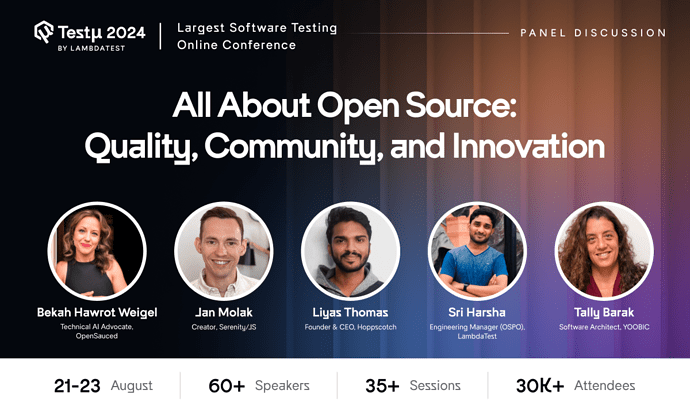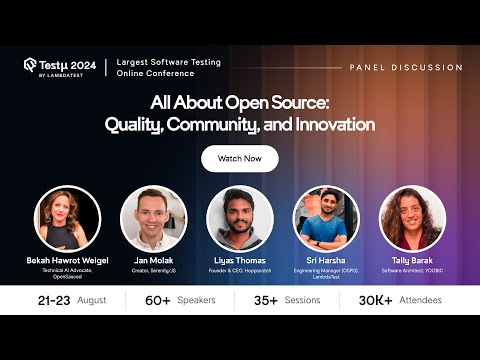 Join the panel of experts as they share their journey through the dynamic world of open-source projects. Discover how to engage and retain a thriving community, manage burnout, and ensure sustained interest. Learn about conflict resolution, fostering inclusivity, and integrating cutting-edge technologies like AI and machine learning into your projects.
Join the panel of experts as they share their journey through the dynamic world of open-source projects. Discover how to engage and retain a thriving community, manage burnout, and ensure sustained interest. Learn about conflict resolution, fostering inclusivity, and integrating cutting-edge technologies like AI and machine learning into your projects. 
Don’t miss this opportunity to gain valuable insights and strategies from leading voices in the open-source community.
Still not registered? Hurry up and grab your free tickets: Register Now!
Already registered? Drop your questions in the thread below 
Hi there,
If you couldn’t catch the session live, don’t worry! You can watch the recording here:
Here are the Some Answered Question that were asked in the Session
What would be the best way for a beginner to join open source community support?
Answer:- The best way for a beginner to join an open-source community is to start by participating in discussions, joining forums or chat groups, and following project mailing lists. This helps you understand the project’s goals and needs, and gradually you can start contributing by helping with documentation, filing bug reports, or reviewing pull requests.
What is the best starting point for a tester to start contributing to open source projects?
Answer:- Testers can start contributing to open source by exploring projects that need help with testing or quality assurance. Begin by reviewing open issues labeled as “good first issue” or “help wanted.” You can start with writing or improving test cases, reporting bugs, or improving test coverage, which provides a good entry point into the community.
In Open source, major drawback is lack of formal support and spreaded documentation. This leads to lot of confusion and hit and trial takes lot of time. How to overcome this and make your search a little stringent and focussed?
Answer:- To overcome the challenges of scattered documentation and lack of formal support in open source, focus on narrowing your search by using specific keywords and exploring community-maintained resources like wikis or FAQs. Engaging with the community through forums or chat channels can also provide valuable guidance and clarify any confusion you might encounter.
Here are some Unanswered Question that were asked in the Session:-
What are your top 5/10 open source tools?
My complaint with open source tools is that we often spend more time maintaining/writing the framework than we do writing the actual automated tests. What’s the secret to escaping that trap?
What is the best approach for testing Native apps using BDD framework?
From the testing perspective, do current-gen AI and automation processes and tools pair well with open source software - and if so, in what ways better than closed-source software?
Review with best practices, Coding standards and a checklist
Do we need to set satndard set of procedures to tackle complexity whether its related to code, documentation, test and reporting?
How to handle security issues in open source projects?
Is selenide support flutter app Testing
In what ways does the open source model impact the long-term sustainability and evolution of software projects?
Given the significance of good documentation for open-source projects, what strategies can be implemented to encourage consistent updates and improvements?
Do we think writing more API test cases can help here to bring innovation and quality?
What is the general consensus of open source code being secure?
What the maintainers envision for the project’s future?
Do you have any advice on how to get a buy-in from your manager/team/company so that we can allocate time within working hours to dedicate to open source projects understanding and contributing to them
Will open source help crowd testing?
![]() Join the panel of experts as they share their journey through the dynamic world of open-source projects. Discover how to engage and retain a thriving community, manage burnout, and ensure sustained interest. Learn about conflict resolution, fostering inclusivity, and integrating cutting-edge technologies like AI and machine learning into your projects.
Join the panel of experts as they share their journey through the dynamic world of open-source projects. Discover how to engage and retain a thriving community, manage burnout, and ensure sustained interest. Learn about conflict resolution, fostering inclusivity, and integrating cutting-edge technologies like AI and machine learning into your projects. ![]()
![]()

